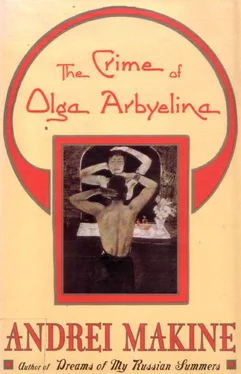Dumbfounded, powerless, she knew she should get up, run to the book room, wake the doctor. But then he would have heard this all too clear delirium! And guessed everything!
The cries ceased abruptly and a second later the doctor-just-between-ourselves opened the door. "Ah, he's found his voice, our young man." He grunted and yawned elaborately.
An hour later he operated. He had flung back the curtains with energetic abruptness, admitting a still pale dawn, unhoped for in that room that seemed doomed to darkness… He made incisions, removed blood clots, swabbed. And gave a commentary on his actions in an almost tender voice, all the time using Russian diminutives, even for the scalpel, the swabs, the saline. She felt as if she were watching a game, and participating in it when from time to time she passed him a bottle, a syringe…
When he left he kissed her hand and promised to come back at noon and even to stay and "browse" (a wink) in the little book room if need be…
She spent the afternoon sometimes in the boy's room, sometimes, when he slept, sitting on the front steps that were all overgrown with wild plants. What the night had revealed to her was unfolding now in a clear and definitive sequence of scenes…
… It had been in the spring of the previous year, possibly exactly a year before. Generally, when she went to Paris with her son, L.M. invited her out to the theater. Or at least, when he invited her, she came to Paris, left the boy at Li's, and came back to collect him in the morning. On that occasion Li had been away and the boy was to spend the night on his own. It was hard to guess how deeply he detested those theater evenings; those nights (when, in theory, his mother came home after the play); and the man who rang the doorbell… Li used to take sleeping drafts-the little sachet that made her vague when she woke up.
"What if you took two of them?" he asked one day.
"Oh, I shouldn't wake up till noon."
"Three?"
"I should sleep like a dead woman."
That evening he emptied three sachets into the cup of tea that the young woman in her black dress was about to drink… An hour afterward he lived through long, frightening, and delicious minutes. The doorbell rang impatiently, furiously; he even heard several oaths, then a drumming on the shutters. The woman lay stretched out on the sofa, her impassive and remote beauty untroubled. There was a squeal of tires as they pulled away outside the window, soon lost in the other sounds of cars in the street… There he was in that little sitting room lit only by a table lamp, a room cluttered with curios, books, and icons… And in the middle of it this woman, this stranger whom he found it impossible to recognize as his mother. Her face was disturbingly youthful; a little capricious crease that he had never noticed before gave a slight upward lift to the corners of her mouth. The curve of her body expressed a strange expectancy.
And apart from the fine haze of perfume he detected quite a new, carnal scent about her, more a ghost than a scent, that filled him with wonder and almost hurt his lungs… He did not yet know how to assess the deepness of her slumber. Ready to take flight at the first flicker of her eyelashes, he stretched out his arm, touched her hand that lay on her stomach, then her shoulder. Then, emboldened, telling himself that, if need be, he would have a good excuse for waking her, he touched the delicate hollow hinted at between her breasts, the beginnings of which were revealed by her décolletage. He had always been fascinated by this spot on a woman's body. She did not stir… Already uneasy, he brought his ear close to the sleeping woman's face. And could hear no breathing. He remembered Li's words: "I should sleep like a dead woman!" Dead! He jumped up in a panic, thought of running to the kitchen to fetch water, then changed his mind. He had seen or read somewhere that doctors put their ear to the patient's chest and even massage it in order to restore breathing. With trembling fingers he unfastened two hooks on the crossed flaps of the décolletage, laid bare a shoulder, then a breast, pressed his ear to it… Finally stood up with a singing in his ears, his breathing irregular. And gazed at her endlessly, this woman unrecognizable beneath her light makeup, with her hair piled high, her black velvet dress, and, above all, her nakedness. This woman who should have belonged to another and who now remained with him, so deliciously accessible to his eyes, to his caress…
"It was a year ago," she thought, calling to mind a dazzling halo of days, of skies seen since then… On the footpath that led across the meadow from the Caravanserai a man appeared. She recognized the doctor-just-between-ourselves approaching with his bag. For the second night.
It rained that night. After the heat of the previous weeks the air seemed cold, autumnal. She remained in an armchair beside the bed until morning. The fever had abated. The wound was no longer bleeding. He slept peacefully and only woke once, in the middle of the night. They looked at each other for a long moment without speaking. Then he screwed up his eyes tightly, as if under the effect of a sudden scalding. She saw his eyelashes gleaming with tiny sparks and hastened to switch off the lamp.
The cool, gray days at the beginning of June marked the habitual lassitude of spring, breathless after a riot of blooming and the heat of May. The foliage was already heavy, dense and dark, like the end of summer. The meadow that sloped down to the river was once more covered with tall grasses, tinged with white here and there by the silvery down of dandelions gone to seed. And steady, quiet rainfall interrupted the mists that hung in the air, as on October mornings.
She liked the calming effect of this brief foretaste of the fall. Since that night of the delirium she knew everything from start to finish about that year of her life. Now, amid the haze of a temporary fall, it seemed as if she had come through, as if she were timidly resuming the interrupted course of her days.
One evening, when walking around the Caravanserai, she noticed that the bushes growing beneath the walls and beside the track were all pearly with white clusters. The dusk air also had this snowy tinge… The night was so chilly she had to light the fire. And did not sleep. Winter nights arose in her mind's eye one after another, beyond words in their hard beauty, with the trembling chasms of their skies, with that same scent of burning bark, a mere detail but which opened up an unfathomable cavalcade of hours. It was the first time she had returned to it. This return still had a bruising intensity. Yet her memory was already initiating her into the mysterious science of entering into that other life.
During these few autumnal days in mid-June, days of her son's convalescence, there flickered within her once more the crazy hope: that someone would listen to her, would understand her, understand, above all, that what she had lived through belonged to a life quite other than her own. So far this someone had no face, only a soul, vast and silent.
THE summer returned with unprecedented storms and a blazing sun that the citizens of Villiers-la-Forêt welcomed as dazzling evidence of the "first real vacation of peacetime" that was the talk of the papers. And even the little community of the Caravanserai sniffed this new air and gathered in the library, animatedly discussing the articles about the Tour de France 47, the first since the war; the new Paris Peace Conference; and especially the headline that proclaimed:
FRANCE FINALLY TURNS THE CORNER…
In spite of herself, or rather with secret complicity, she succumbed to this seasonal excitement. One day she caught herself studying the photos in a newspaper accompanying a long feature, "Where to Spend your Vacation," with envious admiration. A family (the parents and their two children) were cycling along a country road. She could not tear herself away from it. She liked everything about these vacationers: their family togetherness; their provisions well wrapped up on their carriers; the quiet road; and the gentle, orderly countryside. She suddenly longed to lose herself, like them, in the happy banality of these summer days, to have their French common sense, "so wonderfully French," she thought. Then she remembered her hope of finding a soul in whom she could confide, to whom she could speak about the depths of despair she had known. That seemed grotesque to her now. She must forget. Yes, forget! For these much-vaunted depths were in fact nothing more than moments of uneasy tenderness that no mother and no son can escape. Quite simply, they had gone a little further than others had done in this forbidden temptation. Besides, there had only been, all in all, eight or perhaps ten nights when…
Читать дальше












